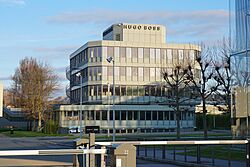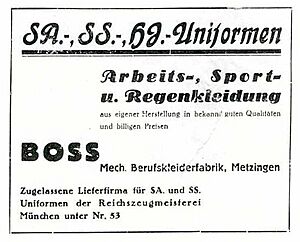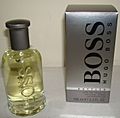Hugo Boss facts for kids

Headquarters in Metzingen, Germany
|
|
| Public (Aktiengesellschaft) | |
| Traded as | FWB: BOSS MDAX Component |
| Industry |
|
| Founded | 1924 |
| Founder | Hugo Ferdinand Boss |
| Headquarters |
,
Germany
|
|
Key people
|
Daniel Grieder (CEO) Yves Müller (CFO/COO) Oliver Timm (CSO) |
| Products | High-fashion Accessories Footwear |
| Revenue | €4.3 billion (2024) |
|
Operating income
|
€361 million (2024) |
| €224 million (2024) | |
| Total assets | €3.782 billion (2024) |
| Total equity | €1.450 billion (2024) |
| Owners | Free Float (64%) Frasers Group (19%) Marzotto family (15%) Own shares (2%) |
|
Number of employees
|
18,623 (2024) |
Hugo Boss AG is a well-known fashion company based in Metzingen, Germany. The company creates and sells many different items, including clothing, accessories, footwear, and leather goods. Hugo Boss is one of Germany's biggest clothing brands, with sales around €4.3 billion in 2024. Its shares are traded on the stock market as part of the MDAX.
The company has two main fashion brands: Boss and Hugo. Hugo Boss also offers other products like children's fashion, eyewear, watches, home items, riding clothes, writing tools, and fragrances through special agreements.
Hugo Ferdinand Boss started the company in 1924. At first, it made general work clothes. In the 1930s, Hugo Boss began making military uniforms for the German government at that time, which greatly increased its sales. After World War II and the founder's death in 1948, the company started focusing on men's suits.
Hugo Boss became a public company in 1988 and launched its first perfumes that same year. Later, it added clothing lines for men and women in 1997, a full women's collection in 2000, and children's clothing in 2006–2007. The company has grown into a major global fashion house. By December 2024, it had 1,532 of its own stores around the world.
Contents
Company History
Starting Out
After World War I, Hugo Ferdinand Boss took over his parents' clothing shop in Metzingen, Germany. In 1924, he opened a factory with two partners to make work clothes. They produced shirts, jackets, sportswear, and raincoats.
During the global economic crisis that followed the Wall Street Crash of 1929, the company faced difficulties. It had to reduce its staff and filed for bankruptcy in 1931. However, Hugo Ferdinand Boss made a deal with his creditors and restarted the business with six sewing machines.
Making Uniforms in the 1930s and 1940s
In 1931, Hugo Ferdinand Boss joined the Nazi Party. After joining, his company received orders to produce uniforms for the Nazi Party and its groups. This helped the company grow, with sales increasing significantly by 1941. The factory was one of many smaller companies that made uniforms.
Hugo Boss did not design the uniforms. The company became a licensed supplier of uniforms for various groups, including the Sturmabteilung (SA) and Schutzstaffel (SS). By 1938, the company focused on making uniforms for the German army (Wehrmacht) and later for the Waffen-SS.
During World War II, Hugo Boss employed about 140 forced laborers, mostly women from the Soviet Union and Poland. Some French prisoners of war also worked there for a short time.
After the war, Hugo Ferdinand Boss was investigated because of his early Nazi Party membership and his company's role in supplying uniforms. He was initially fined and lost some rights, but later his classification was changed to a "follower," meaning he was not seen as an active promoter of the Nazi Party.
In June 2000, Hugo Boss joined a German business initiative to compensate forced laborers. The company also funded an independent study of its history during that period, which was published in 2011. That same year, the company expressed "profound regret" to those who suffered at the factory under Nazi rule.
Growing into a Fashion Company
Hugo Ferdinand Boss passed away in 1948, but his business continued. His son and son-in-law took over. Initially, the company made uniforms for the French army and other public services. In 1950, Hugo Boss received its first order for men's suits, and by 1953, these suits were available in stores.
By 1960, the company was producing ready-made suits. In 1967, the founder's grandsons, Jochen and Uwe, took over and began to expand the company internationally. The first Boss branded suits were made in 1970. The Boss brand became a registered trademark in 1977. Around this time, the company also started sponsoring Formula One racing teams.
In 1984, the first Boss perfume was launched. This helped the company grow enough to be listed on the Frankfurt Stock Exchange in 1985. The brand also began sponsoring golf and tennis events. In 1989, Boss launched its first licensed sunglasses. Later that year, a Japanese group bought the company.
In 1991, the Marzotto textile group bought a large share of Hugo Boss. In 1993, the Hugo, Boss, and Baldessarini brands were introduced. The Holy brothers, who had been running the company, left, and Peter Littmann became the new Chairman.
In 1995, the company launched its footwear range, which grew into a full line of leather products. Hugo Boss also started a partnership with the Solomon R. Guggenheim Foundation, leading to the Hugo Boss Prize for modern arts.
Women's fashion (Hugo Womenswear) was first introduced in 1998, along with the first women's perfume. Since then, many more perfumes and skincare products have been launched. In 1999, Hugo Boss launched its first website. The Boss Orange brand for casual wear was also launched in 1999, followed by Boss Selection (2004) and Boss Green (2004).
Recent Developments

In 2002, Bruno Sälzer became the CEO. Under his leadership, Hugo Boss grew into a lifestyle group, improved its women's clothing line, and expanded globally, especially in Asia. In 2005, the Marzotto group separated its fashion brands into the Valentino Fashion Group. In 2007, a financial investor named Permira acquired Valentino, which then influenced Hugo Boss.
Claus-Dietrich Lahrs became CEO in mid-2008. Soon after, the company launched online shops in the UK and other countries. By 2009, the Boss brand made up most of the company's sales. In 2010, Hugo Boss had sales of over $2.3 billion and operated in 124 countries with many stores.
In June 2013, designer Jason Wu was hired to lead the Boss womenswear collection, a collaboration that ended in 2018. In 2015, Permira sold its remaining shares, making 91% of Hugo Boss shares available on the Frankfurt Stock Exchange.
Mark Langer became the new CEO in 2016. That same year, Coty took over the perfume licenses for Hugo Boss. The company then made some changes, stopping the Boss Orange and Boss Green lines to focus only on the Boss and Hugo brands. They also adjusted prices, closed unprofitable stores, and expanded their online business. In 2017, Hugo Boss was included in the Dow Jones Sustainability Indices for the first time.
In 2020, Mike Ashley's British Frasers Group acquired a stake in Hugo Boss. By December 2024, the Frasers Group increased its direct ownership in the company to 19.25%.
In June 2021, Daniel Grieder became the CEO. He introduced a growth plan called "Claim 5" to improve customer experience, product offerings, and growth worldwide. He aimed for €4 billion in revenue by 2025, a goal reached two years early. In June 2023, Hugo Boss increased its revenue target for 2025 to €5 billion.
In 2022, Marco Falcioni was appointed Creative Director. Hugo Boss also invested in a start-up called Heiq Aeoniq LLC, which develops a new fabric from materials like algae and sugarcane. This fiber was first used in the company's textiles in 2023.
To meet growing demands, the company invested €100 million in a new distribution center near Stuttgart in 2023. This investment focused on digital tools, automation, and robotics. In June 2023, Hugo Boss also opened its Hugo Boss Digital Campus in Gondomar, Portugal.
Products and Brands
Since 2017, Hugo Boss has focused on two main brands:
- Boss: This is the main brand, offering upscale business and casual wear. It includes clothing for both women and men, aimed at an older audience (like millennials). In 2022, Boss Womenswear made up 10% of the company's total sales.
- Hugo: This brand is for a younger audience, including Generation Z. It offers fashion for both men and women. In February 2024, Hugo Boss launched a new line called Hugo Blue, featuring clothing made from denim and other fabrics.
Hugo Boss also has special agreements with other companies to produce various licensed products:
- Children's clothing: Collections for children have been available since 2008. The license for children's clothing is held by C.W.F. Children Worldwide Fashion SAS. Children's clothing is produced under both the Boss and Hugo brands.
- Shoes: Hugo Boss has been making shoes since 1995. Since 2004, the company has produced shoes in-house under its Boss and Hugo brands.
- Fragrances: Perfumes, creams, deodorants, and shower gels for men and women are sold under the Boss and Hugo names. The first Boss perfume, launched in 1984, is still sold today.
- Eyewear and watches: The company has been producing eyewear since 1989 and watches since 1996 through licenses.
- Home textiles: Since 2011, the Boss Home collection has offered bed linen, towelling, and other home textiles under license.
- Riding apparel: Since August 2023, Hugo Boss has had riding apparel produced under the Boss Equestrian brand.
- Writing instruments: Hugo Boss also has writing instruments manufactured under license.
- Dog accessories: The company has been producing accessories for dogs under license since 2022.
- Tourism industry: In early 2024, the company took over a luxury rental villa in Bali, offering Boss-branded items as gifts to high-paying clients.
Hugo Boss products are made in various locations, including its own factories in Metzingen, Germany; Morrovalle, Italy; Radom, Poland; İzmir, Turkey; and Cleveland, United States. The company uses advanced technology for its custom-made clothing, using machines for many steps traditionally done by hand.
In 2020, Hugo Boss created its first vegan men's suit, made entirely from non-animal materials, dyes, and chemicals.
Stock Market Information
Hugo Boss shares have been part of the MDAX stock index since March 1999. As of February 2025, the company's ownership is divided as follows:
- Free float (shares available for public trading): 64.00%
- Frasers Group: 19.00%
- Marzotto family: 15.00%
- Company's own shares: 2.00%
Marketing and Partnerships
Since the 1980s, Hugo Boss has used product placements and dressed celebrities. For example, Hugo Boss dressed actors in the popular US TV series L.A. Law and Miami Vice. Famous people like Michael Jackson and Sylvester Stallone also wore Boss outfits.
From 1996 to 2022, Hugo Boss sponsored the Hugo Boss Prize, a $100,000 award in modern arts given by the Solomon R. Guggenheim Foundation. The company also supports fashion students with the Hugo Boss Fashion Award since 1987.
In February 2024, a fashion collection designed by supermodel Naomi Campbell was launched. In March 2024, Hugo Boss became the official outfitter for tennis player Taylor Fritz. In May, the company announced a multi-year partnership with former football player David Beckham, who will design his own collections.
Since September 2024, Hugo Boss has been the official partner and outfitter of the German football club VfB Stuttgart.
Social Responsibility
Hugo Boss has been a partner of the child protection organization UNICEF since 2007. The company also created the Hugo Boss Foundation, which supports local and global projects, especially in climate and environmental protection. The foundation helped rebuild a vocational school in Antakya, Turkey, after an earthquake in 2023, providing tools and training.
In 2024, the Hugo Boss Foundation started long-term partnerships with Coral Gardeners, an organization restoring coral reefs, and GVK Society in India, which promotes sustainable farming.
Sustainability Efforts
In 2016, Hugo Boss joined the ZDHC Foundation, which works to avoid harmful substances in production. Since 2017, Hugo Boss has been working towards the UN Sustainable Development Goals. The company also joined the Klimabündnis Baden-Württemberg in 2024.
Sustainability is a key part of the company's "Claim 5" strategy. As part of this, the resale website Hugo Boss Pre-Loved was launched in 2022 to promote a circular economy. The company's investment in Heiq Aeoniq LLC supports the development of a new cellulose fiber from materials like algae, sugarcane, and straw, which aims to replace chemical fibers like polyester.
At the Hugo Boss Digital Campus, data is used to make company processes more efficient and to better predict product demand, helping to avoid overproduction. The company is also working to track its supply chains more closely to ensure environmental and social standards are met. Hugo Boss aims to become CO2-neutral by 2050.
Since December 2023, Hugo Boss has been the first company to invest in Collateral Good Ventures Fashion I, a fund that supports sustainability in the fashion industry. In 2025, a new subsidiary, Eightyards GmbH, began operations to coordinate the reprocessing and reuse of the group's extra textiles.
Company Standards
Hugo Boss has put in place systems to ensure good practices. It works with the Fair Labor Association to ensure fair working conditions. The company also has an ombudsman system and conducts social audits on working conditions.
Sports Sponsorships
Hugo Boss has a long history of sponsoring sports, including motorsport, golf, association football, sailing, tennis, and winter sports. The company started supporting racing driver Jochen Mass in the 1970s. It sponsored the McLaren Formula 1 team from 1981 to 2014, one of the longest partnerships in motorsport. Many drivers, including Alain Prost, Ayrton Senna, and Niki Lauda, wore Hugo Boss clothing. Since July 2022, Boss has been the official clothing partner of the Aston Martin F1 team. In 2023, Aston Martin driver Fernando Alonso also became a brand ambassador. In 2024, Boss signed a partnership with David Beckham.
Athletics
- Alica Schmidt (Germany)
Ski
- Hahnenkamm Races in Kitzbühel (Austria)
Tennis
- Tournaments:
* Stuttgart Open (Germany) (known as Boss Open since 2022)
- Players:
* Matteo Berrettini (Italy) (global ambassador since 2022) * Taylor Fritz (USA)
Formula One
- Teams:
* McLaren (UK) (1987–2014) * Mercedes-Benz (Germany) (2015–2018) * Aston Martin (UK) (2022–2025) * RB (Italy) (2024–)
- Drivers:
* Jochen Mass (Germany) * Alain Prost (France) * Mika Häkkinen (Finland) * Ayrton Senna (Brazil) * Niki Lauda (Austria)
Cycling
- Teams:
* Red Bull–Bora–Hansgrohe (Germany) (2024–)
Images for kids
See also
 In Spanish: Hugo Boss AG para niños
In Spanish: Hugo Boss AG para niños
 | May Edward Chinn |
 | Rebecca Cole |
 | Alexa Canady |
 | Dorothy Lavinia Brown |



